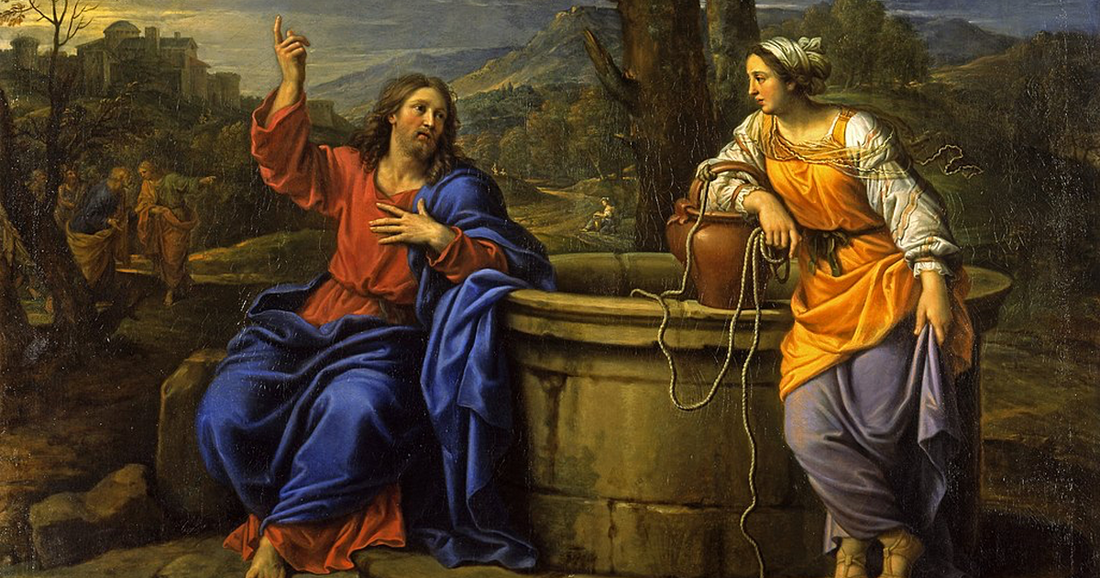
What Are You Thirsting For?
Dr. Edward SriWhat are you thirsting for? In this episode, Dr. Sri explains the great depth of the story of the Samaritan woman at the well. He explains its significance and also reveals our place in the story.
Snippet from the Show
Do you thirst for Jesus?
Pilgrimage to Rome with Dr. Edward Sri
Dr. Sri recently announced that he will be taking a pilgrimage to Rome June 22-30 of this year. For more information, email rome.edwardsri@gmail.com.
Events with Dr. Sri
- Mar 15-16: St. Martha’s Church Parish Mission – Depew NY
- Mar 16: St. Mary’s Swormville, East Amherst NY
- Mar 23-25: St. Michael the Archangel Parish Lenten Mission, St. Michael MN
- Mar 28-29: St. Jude Parish Lenten Mission, Lakewood CO
- Mar 30-31: All Souls Catholic Church Parish Retreat, Sanford FL
- Apr 1-2: Fullness of Truth Catholic Evangelization Ministries – Corpus Christi TX
- Apr 9: Ignited by Truth Conference – Raleigh NC
The Samaritan Woman
In John 4:5-42, we find the story of the Samaritan woman at the well. To set the scene, realize that Christ would be traveling from Jerusalem to Galilee. This is important because traveling to Galilee via Samaria was not the most direct route. In fact, it made the journey much more difficult and usually, Jews and Samaritans avoided any interactions with each other.
Knowing this, we can understand that Christ’s motivation to travel via Samaria was not out of convenience, but out of love. He was seeking the heart of the Samaritan woman.
Christ Asks for a Drink
This passage tells us that it was the sixth hour when Christ met the Samaritan woman at the well. This is significant because the sixth hour would’ve been the hottest time of day. This was not the typical time for the women to come to the well and draw water. Typically, this was done at the cooler times of the day. However, this is when the Samaritan woman came. Christ begins their conversation not by immediately pointing out her sinfulness or shortcomings. Instead, he simply asks for a drink. This is astonishing because it reveals that he desires something from her. He needs something from her.
In reflecting on these words, Mother Teresa points out that these words really point to God’s longing for us. He thirsts for you. And in turn, he desires that you thirst for him.
The Samaritan Woman’s Response
The Samaritan woman’s response is shock. She is shocked for multiple reasons. First, the Samaritans and the Jews were not friendly. They did not have dealings with each other. Second, she was a woman and they were alone. In those times, this would not have been appropriate. However, Christ is there and he is seeking her out. He longs for her. He offers her “living waters.”
Jesus explains to her that the water he offers will quench her thirst. She will never thirst again.
Verse 16 “Go call your husband.”
Now, we come to the part of this story that seems to be a complete change in subject. However, it is a continuation of what Christ has already been saying to the woman. When she reveals that does not have a husband and Christ points out that this true and she has, in fact, had five husbands, he is revealing to her that she has been seeking to quench her thirst through men instead of God.
The Significance of the Samaritan Woman
There is something even deeper happening in this part of the passage. If we go back to the Old Testament, we will learn about the Samaritan people being conquered by the Assyrian Kingdom. Whenever the Assyrian Kingdom conquered a nation, they would spread the nation apart and also intermix other nations with them. They did this so that the nations would inter-marry and break down each other’s ethnic identity. In the case of the Samaritans, the Assyrians brought in five other nations. Each of these nations worshiped a different god. These gods were referred to as baal. As the Samaritans married people from these other nations, they also began to worship their gods. Baal can be translated a number of different ways (god, master, lord), but one of them is “husband.”
The Samaritan woman is an embodiment of the history of her people. We can see the parallel between her five husbands and the five gods that the Samaritans began to worship.
We Are the Woman at the Well
Although we may not idolize pagan gods, each of us has idolized something in our lives. It could be social media, sports, popularity, work, or so many other things. We seek to quench our thirst by looking in so many places other than God. Only God can satisfy our thirst. If we can learn to thirst for him. If we can choose to thirst for him, we will be satisfied. It is also incredibly important to realize that God thirsts for you. He reveals his desire for us always and waits for us to thirst for him in return.